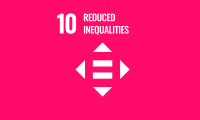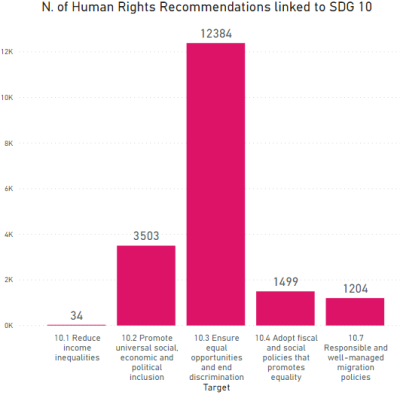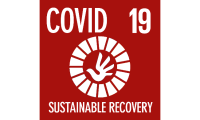SDG 10 and Sustainable Recovery

Key aspects of SDG 10:
1. Empower and promote inclusion of all, eliminate discriminatory laws, policies and practices, and adopt fiscal, wage and social protection policies to achieve equality (10.2, 10.3, 10.4)
The virus may be indiscriminate, but its effects are not. Some population groups are disproportionately affected by the pandemic. Often, these populations tend to be the marginalized and excluded; those who depend heavily on the informal economy for earnings; occupy areas prone to shocks; have inadequate access to social services; lack social protection; have low levels of political influence and lack voice and representation; have low incomes and limited opportunities to cope or adapt; and have limited or no access to technology. Such inequalities are often due to discrimination on the basis of age, gender, race, ethnicity, religion, migrant status or other forms of discrimination. Moreover, these patterns of discrimination and vulnerability intersect.
The pandemic has exacerbated existing inequalities and further exposed people who are poor and in vulnerable situations to new risks. COVID-19 also puts at risk the limited progress that has been made on gender equality and women’s rights over the past decades. The gender gap is widening.
The COVID-19 pandemic has required governments around the world to develop and adopt large-scale fiscal stimulus packages in record short time. Poorly designed fiscal and social protection policies can deepen existing and create new inequalities within countries. Fiscal stimulus has been unevenly distributed worldwide when compared to the scale of labour market disruptions.
Sustainable response and recovery actions:
Actions to reduce inequality within countries are fundamental and wide-ranging and include: putting human rights at the centre of economic policy and planning; applying macro-economic measures that are proven to reduce inequality; expanding systems for the universal provision of quality public services from birth to old age without discrimination; identifying and empowering vulnerable groups to participate in public dialogue and policymaking; and holding duty-bearers to account for sustainable development and human rights commitments and obligations.
Antitrust and other policies to address imbalances in market powers and the declining income share for workers are important.
Redistribution of wealth through progressive taxation is key to ensuring that the recovery is paid for by those who can best afford it. New principles for international taxation to ensure fair play, to avoid a race to the bottom and to deter tax evasion are important.
International solidarity and cooperation coupled with effective, people-centred, multilateral mechanisms are essential to effectively address inequalities between countries.
Visit the documents and resources listed in the “Key Human Rights Guidance” below for more information.
Universal Declaration of Human Rights (UDHR), art 21.2.: Everyone has the right of equal access to public service in his country.
Universal Declaration of Human Rights (UDHR), art. 22: Everyone, as a member of society, has the right to social security and is entitled to realization, through national effort and international co-operation and in accordance with the organization and resources of each State, of the economic, social and cultural rights indispensable for his dignity and the free development of his personality.
Universal Declaration of Human Rights (UDHR), art. 23.2: Everyone, without any discrimination, has the right to equal pay for equal work.
Universal Declaration of Human Rights (UDHR), art 25.1: Everyone has the right to a standard of living adequate for the health and well-being of himself and of his family, including food, clothing, housing and medical care and necessary social services, and the right to security in the event of unemployment, sickness, disability, widowhood, old age or other lack of livelihood in circumstances beyond his control.
Others: Convention on the Elimination of All Forms of Discrimination against Women (CEDAW), Convention on the Rights of the Child (CRC,) International Convention on the Elimination of All Forms of Racial Discrimination (ICERD), Convention on the Rights of Persons with Disabilities (CRPD), International Convention on the Protection of the Rights of All Migrant Workers and Members of their Families (CRMW), United Nations Declaration on the Rights of Indigenous Peoples (UNDRIP) encompass more specific rights and guidance on measures to ensure equal access and opportunity for specific disadvantaged groups.
International Labour Organisation (ILO) C100 Equal Remuneration Convention: This fundamental ILO Convention requires ratifying countries to ensure the application to all workers of the principle of equal remuneration for men and women for work of equal value.
International Labour Organisation (ILO) C111 Discrimination (Employment and Occupation) Convention: This fundamental ILO Convention defines discrimination as any distinction, exclusion or preference made on the basis of race, colour, sex, religion, political opinion, national extraction or social origin, which has the effect of nullifying or impairing equality of opportunity or treatment in employment or occupation.
Key Human Rights Guidance
- COVID-19 challenge for indigenous peoples, Expert Mechanism on the Rights of Indigenous Peoples (EMRIP), Statement, 2020
- Racial discrimination in the context of the COVID-19 crisis, The Office of the High Commissioner for Human Rights (OHCHR), Topics in focus, 2020
- COVID-19 and indigenous peoples’s rights, The Office of the High Commissioner for Human Rights (OHCHR), Topics in focus, 2020
- Warning on the grave physical, emotional and psychological effect of the COVID-19 pandemic on children and call on States to protect the rights of children, Committee on the Rights of the Child (CRC), Statement, 2020
- Equality and non-discrimination on persons with disabilities, Convention on the Rights of Persons with Disabilities (CRPD), General Comment, No. 6, (CRPD/C/GC/6), 2018
- The equality of rights between men and women, International Covenant on Civil and Political Rights (CCPR), General Comment, No. 28, Art. 3 (HRI/GEN/1/Rev.9 (Vol. I)), 2000
- Equal right of men and women to the enjoyment of all economic, social and cultural rights, International Covenant on Economic, Social and Cultural Rights (ICESCR), General comment, No. 16, Art. 3 (E/C.12/2005/4), 2005
- COVID-19 and minority rights: overview and promising practices, The Office of the High Commissioner for Human Rights (OHCHR), Topics in focus, 2020
- Equitable Access to COVID-19 Vaccines for All Migrants, UN Committee on Migrant Workers, UN Special Rapporteur on the Human Rights of Migrants / Special Procedures, United Nations High Commissioner for Human Rights (OHCHR), Joint Guidance Note, 2021
- List of General Recommendations, Committee on the Elimination of Racial Discrimination (CERD), website
- List of General Recommendations, Committee on the Elimination of All forms of Discrimination Against Women (CEDAW), website
- Discrimination in Employment and Occupation), Committee of Experts on the Application of Conventions and Recommendations (CEACR) and International Labour Organisation (ILO), General Observation, No. 111, 1958
- Fundamental conventions concerning rights at work, International Labour Organisation (ILO), General Survey, 2012
- Recommendations from human rights monitoring mechanisms linked to SDG 10 by country, Danish Institute for Human Rights, search page
- Inequality and the UN Human Rights Mechanisms, Open Global Rights, 2019
- Human rights law and standards linked to SDG 10 by target, Danish Institute for Human Rights, search page

Explore all Recommendations from human rights monitoring mechanisms linked to SDG 10 by country

